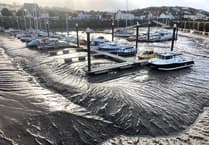HUNTSMAN and businessman Gary Bradley suffered a massive stroke days after receiving multiple traumatic injuries when he was thrown from his horse in a hunting accident.
Mr Bradley, who ran GB Scaffolding and lived at Timberscombe, was riding with the Minehead Harriers when the accident happened in Blagdon Wood near Wheddon Cross on January 15.
Approaching a gate, his horse ducked to the side and stumbled down a steep embankment.
The 55-year-old married father and grandfather was dragged along, with one foot still in the stirrup, and hit a tree.
He was airlifted to Musgrove Park Hospital in Taunton but died in Bristol's Frenchay Hospital 11 days after the accident.
An inquest into his death in Taunton on Tuesday heard from specialist neurological pathologist Dr Tim Moss that the primary cause of death was the cerebral infarction - stroke - due to his traumatic injuries, with the secondary cause partly treated pneumonia.
But in a hearing which lasted more than three hours, solicitor Richard Follis, representing Mr Bradley's family, questioned medical experts from Frenchay and Musgrove, where Mr Bradley was treated until the day before his death.
Mr Follis raised concerns about Mr Bradley's treatment, including the decision to keep him on a ventilator to help him breathe and his risk of suffering a stroke following his injuries.
Doctors only discovered evidence of the stroke by chance during a whole body scan on January 24, which was carried out to identify if Mr Bradley's rising temperature was due to further infection, other than the already identified pneumonia.
But they concluded that it had happened around 48 hours previously.
Dr Moss told the inquest that stroke was a recognised complication of traumatic injuries such as those suffered by Mr Bradley.
But he said there was a huge controversy as to why this should be: "The fact that it happens is known but the reasons why are subject to great debate," he said.
"There was evidence that this man had sustained a severe head injury but there was no evidence of a brain injury."
The hearing heard that Mr Bradley's injuries included fractures to his skull, face and pelvis, a dislocated kneecap, broken ribs and chest injuries.
But doctors had told the family their main concern was his pelvic fracture and not the head injury.
Dr Andrew Daykin, consultant anaesthetist in intensive care, said Mr Bradley had been expected to survive his injuries but the massive stroke changed his circumstances.
And consultant neurosurgeon at Frenchay Mr David Porter said Mr Bradley had a mild head injury when he was admitted to Musgrove, a skull fracture that was not of immediate concern.
But following the stroke he faced death or severe disability.
Fellow huntsman Charles Cox, who was riding behind Mr Bradley when the accident happened, told the inquest that he had also been thrown from his horse and injured.
The two men had reached a gate, which Mr Cox's horse attempted to jump.
But Mr Bradley's horse decided to "duck out" and went down the embankment.
"Once Gary's horse started to go, it could not keep its feet," said Mr Cox.
"It was a very, very steep bank. I saw him hit the tree mid-chest and after that his foot came out of the stirrup.
"When I reached him he was unconscious," he said.
"I put his head in my lap and checked his airways."
Mr Cox used a hunt radio to summon help and said by the time paramedics arrived Mr Bradley was conscious and talking.
Mr Bradley's widow Gail said her husband was claustrophobic and, once in hospital, became agitated.
Medical staff tried to take him off the ventilator the day after the accident and on the following Tuesday but had to re-intubate him on both occasions.
She said her husband had always been calm when she and other family members were with him and they offered to stay at the hospital all day and night to ease his agitation.
Returning a narrative verdict, West Somerset coroner Michael Rose said tests carried out at Musgrove had shown no evidence of brain injury and he was satisfied that the medical team thought there were proper reasons for putting Mr Bradley on a ventilator because of his agitation.
Mr Rose said he wanted to extend his deepest sympathies to Mr Bradley's family, who had taken the difficult but right decision for doctors not to attempt to operate to reduce the swelling in his brain.
"One always regards riding as an attractive pastime but this is the third time this year I have presided over a riding accident," he said.
"It does carry with it certain risks."



